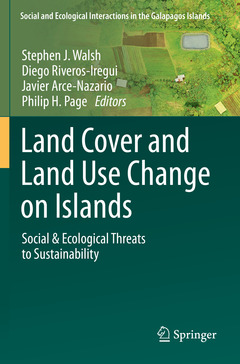Land Cover and Land Use Change on Islands, 1st ed. 2020 Social & Ecological Threats to Sustainability Social and Ecological Interactions in the Galapagos Islands Series
Coordonnateurs : Walsh Stephen J., Riveros-Iregui Diego, Arce-Nazario Javier, Page Philip H.

1) Introduction
2) Climate and Environmental Change... (sea-level rise, ENSO Events)
3) Tourism & Population Migration... (immigration of tourist and residents, job transitions, household livelihoods)4) Land Cover/Land Use Change... (deforestation, urbanization, agriculture, land abandonment)
4) Geographic Accessibility Land Socio-economic Connectivity... (regional & international trade, governance, colonial legacies and aid programs)
5) Resource Constraints... (freshwater availability & ecosystem goods and services)
6) Natural Hazards... (hurricanes, coastal erosion & volcanism)
7) Challenges Imposed by the Expanding Human Dimension... (invasive species, population migration,economic development & transportation).
8) Conclusion (synthesis)
Presentation of results from a meta-analysis of global islands and the social-ecological drivers of change that operate a range of space-time scales
Description of state-of-the-art methods to characterize land cover/land use change on islands that fuse satellite imagery at multiple scales with image processing approaches to enhance landscape views of islands, urban areas, and small-scale agriculture
Multiple case studies are presented for islands around the globe in which human-environment interactions are assess as causes and consequences of land cover/land use change in island ecosystems
International tourism, population migration, and resource limitations are assessed as forces of change on islands
Biophysical, socio-economic, and cultural characteristics of islands are examined within the context of globalization, climate change, and island sustainability
Date de parution : 07-2021
Ouvrage de 307 p.
15.5x23.5 cm
Disponible chez l'éditeur (délai d'approvisionnement : 15 jours).
Prix indicatif 105,49 €
Ajouter au panierDate de parution : 07-2020
Ouvrage de 307 p.
15.5x23.5 cm
Disponible chez l'éditeur (délai d'approvisionnement : 15 jours).
Prix indicatif 105,49 €
Ajouter au panier


